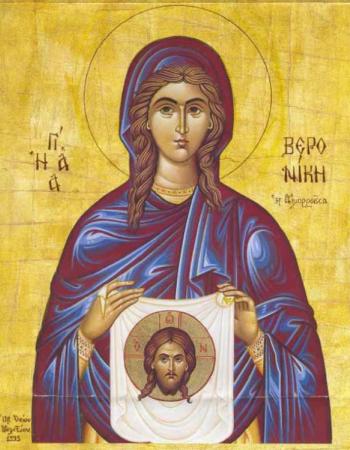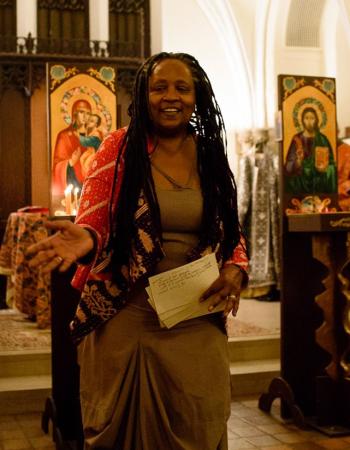"Who touched me?” Jesus said. He was walking through the city and crowds of people were following him eager to see this man, this healer and teacher who calms the sea and drives out demons.
Luke tells us the people were expecting him. His friends, the disciples, denied that he had been touched: they have no clue. Peter responds, “Master, the people are crowding and pressing against you.”
But Jesus says, “Someone touched me; I know that power has gone out from me.”
And here we see the power and drama of Luke’s narrative. Because we know who touched Jesus. It was a woman who had walked up behind him and knelt to touch his coat. And we know why she approached as she did. She was suffering from a twelve-year issue of blood, a flow that made her unclean in her home, where she could not be with her husband and could not sit on the floor cushions. She could not be out in public where she might touch any person. We’re told that “no one could heal her." And thus the drama: what would happen next? This bleeding woman, shunned and isolated, touches Jesus’s garment. What would happen when he turned around, especially since he’d said,” Power has gone from me.”
I am shocked every time this Gospel reading comes around in the church year. And this story appears in all three of the synoptic Gospels. That Jesus met with women, traveled with them and accepted them into his inner circle was itself startling in an age when unmarried men did not do such things. And here was a woman who was menstruating, bleeding, a condition that is unique to each woman and at the same time universal. It is accepted as a sign of fertility that signals woman’s vital role in generating and birthing new life from her own body--and yet society sees menstruation as shameful, disgusting. It engages the sight and smell of blood, which is taboo in daily life yet essential for ritual sacrifice. Blood from an injury or wound, the blood of a warrior, requires instant attention from everyone around. But blood from a woman, a natural and vital process for life-giving maternity, was considered foul, the woman unclean.
It’s not much different today. Menstruation is not to be spoken of in public. Many of us are unaware that it happens at all until blood appears and we think that something terrible and awful has happened to us. Then we are taught the mysteries of our bodies, cloaked in secrecy spoken with other women congratulating us for entry into female society and lamenting the years of physical discomfort to come. We are taught how to clean up after ourselves. We are embarrassed if we are found out during our time. And, more recently, we can be ridiculed for the emotional instability supposedly produced by the cycle of hormones which purportedly makes us incompetent for responsible roles in society.
Monthly bleeding is normal and natural, it is necessary for procreation and at the same time messy and painful and uncomfortable. Being a woman is an honorable and noble part of one’s identity, one’s inner being, and how one lives in the world yet this stigma wraps us in shame.
The cycle had gone horribly wrong for this woman and she had found no relief for years. It happens, it happens today, and it is frightening and debilitating. (I speak for women who identify as female and whose bodies do, in fact, produce monthly menstruating cycles. People who identify otherwise may have different personal and societal experiences.)
A bleeding woman! She steps forth, Luke tells us, “seeing that she could not go unnoticed.” She “came trembling and fell at his feet.” There is no doubt she is fearful: of being rebuked, humiliated, sent back in shame to her family. With all of this, “in the presence of all the people,” she tells Jesus about her situation and that, by touching him, she has been healed. “In the presence of all the people”! What courage she had. She, in her shameful state, left her house, mingled with the crowd, found her way to Jesus in hope that this one person could heal her.
St Ambrose wrote: Holy, discreet, religious, quick to believe, restrained by modesty. Because there is modesty and faith in recognizing her infirmity, not to despair of forgiveness—-discretion therefore made her touch the fringe, faith brought her closer, religion to believe, wisdom to know that it was healed.
I would offer different words. For discreet I would say “deliberately inconspicuous”; for restrained by modesty, “shame”; for discretion, “courage.” St. Ambrose honors this woman and her agency. Indeed, in some Orthodox traditions, the woman is named Veronica, the woman who came forward to wipe Jesus’s face as he carried the Cross to Golgotha and whom we venerate today. I feel a deep identification with her and salute her bravery. Jesus says to her, “Daughter.” And I cry. Every time. Jesus looked at this woman who had appealed to him and called her daughter: a term of such intimacy and love, a term that signifies a tender and protected place in the family. Jesus would face me and call me, "Daughter." And my reaction surprises me, every time. How often do I hear a woman called Daughter by Jesus in the Gospels? How often in Liturgy? Not enough for me to feel completely embraced, as a woman, as a woman all the time, at all ages and every day.
St. John Chrysystom writes: she heard him call to her, Daughter. For she was saved through faith, as our faith in Christ makes us children to him. She put her faith in practice by reaching out to him. Today, we women are daughters of Christ. We need not feel shame for our bodies; we need not be isolated and shunned. The call for full inclusion in the Church is not an artifact of third-wave feminist theory, but found in Scripture. Jesus was touched and looked in the woman with compassion. After he left her he went to raise a young girl, twelve years old, on the brink of maturity—-this at a time when sons were preferred and daughters mere adjuncts. Jesus was touched. and power left him.
But we know that God’s power is not limited. It radiates to all. We are all welcomed into the family as daughters and sons. Would that our present-day leaders be touched by our faith when we reach out to them. Our faith calls us to reach out to Jesus, to be at home with God, to be recognized, healed and whole. And we are called today to act out our faith by following Jesus. As St. Teresa of Avila writes, Christ has no body now but yours. No hands, no feet on Earth but yours. Yours are the eyes with which he looks with compassion on this world. Yours are the feet with which he walks to do good. Yours are the hands through which he blesses all the world. Yours are the hands, yours are the feet, yours are the eyes; you are his body. Christ has no body now on earth but yours.


Judith Scott holds an master's degree in theology from Union Theological Seminary. She was a principal in the New York City Public Schools as well as a hospital chaplain.


